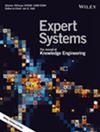What distinguishes conspiracy from critical narratives? A computational analysis of oppositional discourse
IF 3
4区 计算机科学
Q2 COMPUTER SCIENCE, ARTIFICIAL INTELLIGENCE
引用次数: 0
Abstract
The current prevalence of conspiracy theories on the internet is a significant issue, tackled by many computational approaches. However, these approaches fail to recognize the relevance of distinguishing between texts which contain a conspiracy theory and texts which are simply critical and oppose mainstream narratives. Furthermore, little attention is usually paid to the role of inter‐group conflict in oppositional narratives. We contribute by proposing a novel topic‐agnostic annotation scheme that differentiates between conspiracies and critical texts, and that defines span‐level categories of inter‐group conflict. We also contribute with the multilingual XAI‐DisInfodemics corpus (English and Spanish), which contains a high‐quality annotation of Telegram messages related to COVID‐19 (5000 messages per language). We also demonstrate the feasibility of an NLP‐based automatization by performing a range of experiments that yield strong baseline solutions. Finally, we perform an analysis which demonstrates that the promotion of intergroup conflict and the presence of violence and anger are key aspects to distinguish between the two types of oppositional narratives, that is, conspiracy versus critical.阴谋论与批判性叙事有何区别?对反对派话语的计算分析
当前互联网上盛行的阴谋论是一个重大问题,许多计算方法都在解决这一问题。然而,这些方法没有认识到区分包含阴谋论的文本与单纯批判和反对主流叙事的文本的相关性。此外,人们通常很少关注群体间冲突在反对叙事中的作用。我们提出了一种新颖的主题区分注释方案,可区分阴谋论和批判性文本,并定义了跨度级别的群体间冲突类别。我们还提供了多语言 XAI-DisInfodemics 语料库(英语和西班牙语),其中包含与 COVID-19 相关的 Telegram 消息的高质量注释(每种语言 5000 条消息)。我们还通过一系列实验证明了基于 NLP 的自动化的可行性,这些实验产生了强大的基线解决方案。最后,我们进行了一项分析,证明促进群体间冲突以及暴力和愤怒的存在是区分阴谋与批判这两种对立叙事的关键因素。
本文章由计算机程序翻译,如有差异,请以英文原文为准。
求助全文
约1分钟内获得全文
求助全文
来源期刊

Expert Systems
工程技术-计算机:理论方法
CiteScore
7.40
自引率
6.10%
发文量
266
审稿时长
24 months
期刊介绍:
Expert Systems: The Journal of Knowledge Engineering publishes papers dealing with all aspects of knowledge engineering, including individual methods and techniques in knowledge acquisition and representation, and their application in the construction of systems – including expert systems – based thereon. Detailed scientific evaluation is an essential part of any paper.
As well as traditional application areas, such as Software and Requirements Engineering, Human-Computer Interaction, and Artificial Intelligence, we are aiming at the new and growing markets for these technologies, such as Business, Economy, Market Research, and Medical and Health Care. The shift towards this new focus will be marked by a series of special issues covering hot and emergent topics.
 求助内容:
求助内容: 应助结果提醒方式:
应助结果提醒方式:


